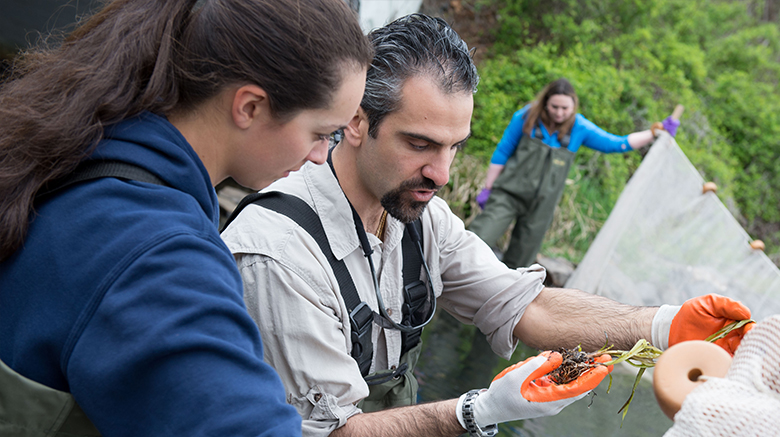At first, he was planning to go the pre-med route.
But when Konstantine Rountos, Ph.D., realized there are careers in the field of environmental science, he quickly switched his focus to marine studies.
“I remember thinking, ‘People actually study the environment for a career?’” said marine ecologist Dr. Rountos, associate professor of biology and coordinator of the environmental studies minor at St. Joseph’s University.
“What clicked for me was that I could be a physician for the environment,” he continued. “I could work on a broader scale, rather than just one person at a time. I could help to resolve issues that affect populations, or I could look at the impacts that humans have on our ocean resources.”
Examining Our Impact on the Environment
For more than 15 years, Dr. Rountos has researched the ecosystems of coastal bays on Long Island — the Great South Bay and Shinnecock Bay — examining how humans have impacted these environments.
“There are a lot of issues in the marine environment,” said Dr. Rountos, who brings field samples back to the Long Island Campus’ biology labs, where he conducts his research. “My lab is interested in the effects of harmful algal blooms (HABs) on the marine environment and has moved into assessing microplastics in our local environment.”
Dr. Rountos and colleagues recently received a three-year, $1 million NOAA grant among collaborators from Stony Brook and Adelphi universities. He will be joined by Kestrel Perez, Ph.D., associate professor of biology at St. Joseph’s, as well as students from both campuses, while examining the effects of ocean acidification and harmful algal blooms on marine fish.
“I first fell in love with research as an undergraduate student, so it is extremely gratifying that I can provide our students with the same opportunity to develop and become inspired,” said Dr. Rountos, head of the sustainability committee at St. Joseph’s University, who had two peer-reviewed publications with his students — one on HABs and most recently one on microplastics.
“SJNY allows me to truly provide these important experiences for my students,” added Dr. Rountos, whose students frequently present their research at regional scientific conferences.

